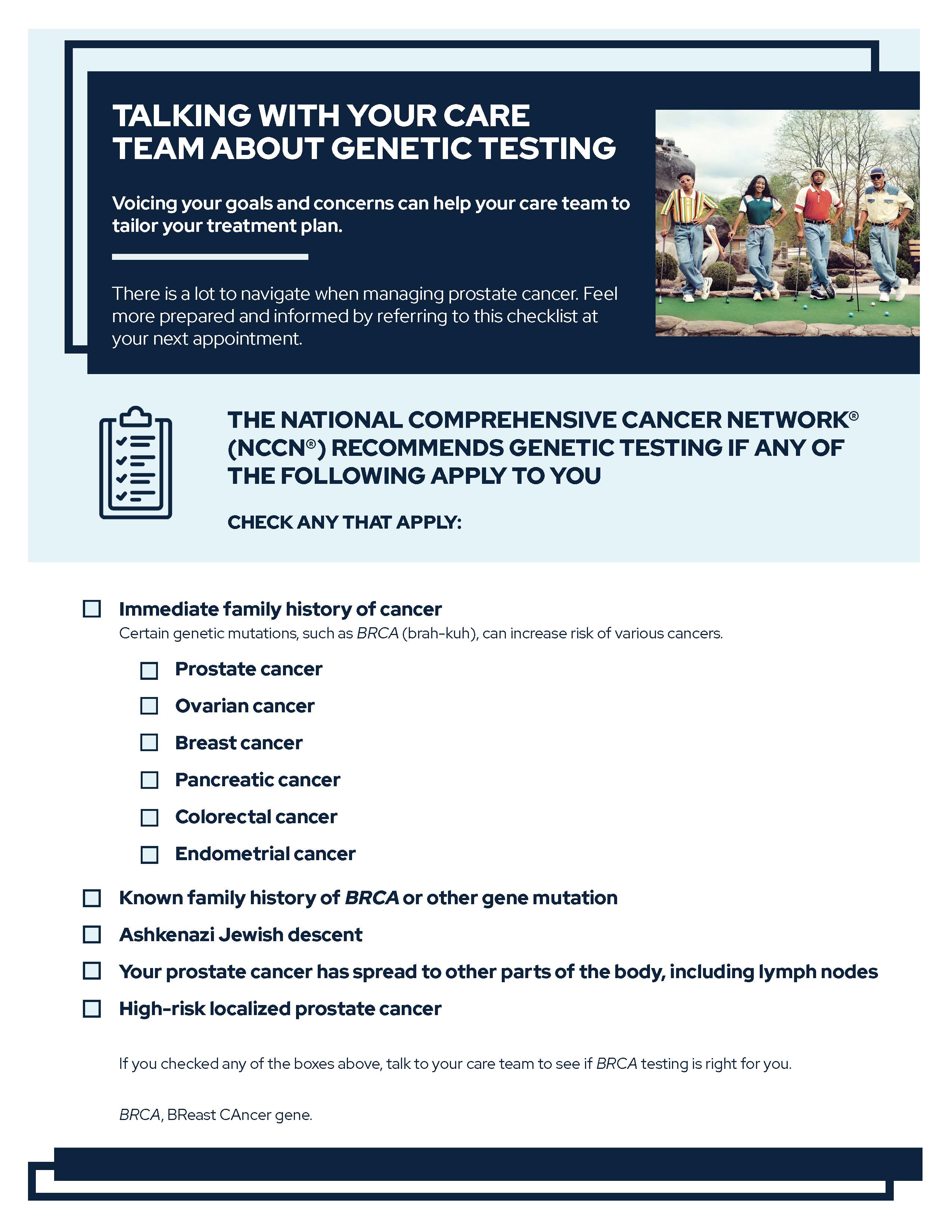Tools for talking to your doctor

DOCTOR DISCUSSION GUIDE
Use this tool to record important disease characteristics and family medical history to guide conversations you have about BRCA testing with your care team.

How to access genetic testing
GENETIC COUNSELOR FINDER
Genetic counselors specialize in interpreting the results of your genetic testing and can advise on any additional actions you may want to take to keep your family healthy.
Prostate cancer support & education
A prostate cancer diagnosis can involve difficult decisions and conversations for you and your loved ones. Here are some supportive resources to help you continue the conversation.
Black men are at higher risk for developing prostate cancer. Learn how to start difficult conversations.
PROSTATE CANCER ADVOCACY GROUPS
This process may be difficult and frustrating at times, but you’re never alone. Visit any of these websites to find more people going through the same experience along with other helpful resources about prostate cancer.
The following programs are not affiliated with Janssen. Be sure to contact the programs directly to get details on eligibility and application requirements, and to see if they have funding available to you.
Find comprehensive educational resources about prostate cancer, including videos explaining genetic testing.
Discover patient advocacy opportunities, access educational resources on prostate health, and find clinical trials and treatment information for prostate cancer.
Hear from other patients with prostate cancer, access support groups and financial support, and become an advocate for prostate health.
Find educational resources and diagnostic tools for prostate cancer and other prostate health conditions.
Glossary
HELPFUL TERMS TO KNOW WHEN TALKING TO YOUR CARE TEAM
A kind of gene that everyone has. If someone’s BRCA1 or BRCA2 gene is mutated, it can increase the risk for several types of cancer, including prostate, breast, ovarian, pancreatic, colorectal, and endometrial
Someone who does not have a BRCA gene mutation
Someone who has a BRCA gene mutation
The removal of cells or tissues for examination by a specialized doctor
An alteration in a cell’s DNA
A specialized healthcare provider who can help patients and families understand their risk of having a genetic condition, along with providing guidance through genetic testing
Different types of tests that can detect gene mutations such as BRCA mutations using a DNA sample
A kind of mutations that exists in all of your cells, is present since birth, and can be inherited by your children
A stage of cancer that means your cancer has spread from the primary location to a distant location (ie, when prostate cancer spreads to the bone)
An alliance of cancer centers that aims to improve patient care
A kind of mutation that is spontaneous (sometimes called "acquired") and develops over time; it cannot be passed down to your children
A type of treatment that selectively kills cancer cells, targeting the specific driver of your cancer
Evidence-based recommendations for the management of a particular disease or medical condition. These guidelines are developed by organizations such as the National Comprehensive Cancer Network® (NCCN®) and are typically based on the latest available clinical data and expert consensus
A group or layer of cells that make up a tumor
Frequently Asked Questions (FAQ)
ANSWERS TO QUESTIONS YOU MAY HAVE ABOUT BRCA MUTATIONS AND PROSTATE CANCER
BRCA [BRACK-uh] stands for BReast CAncer gene. Mutations in the BRCA genes can increase the risk for several types of cancer, including prostate, breast, ovarian, pancreatic, colorectal, and endometrial.
BRCA mutations have historically been overlooked in prostate cancer compared to other cancers due to the assumption that they are less common. However, recent research has shown that BRCA mutations occur in ~10% of metastatic castration-resistant prostate cancer patients and can impact treatment outcomes.
The cost of testing can vary depending on the specific test and laboratory used, as well as factors such as the complexity of the test and whether it is germline and/or somatic. Coverage by Medicare or your insurance plan may depend on factors such as your medical history, age, and family history of cancer. It's best to check with your healthcare provider and insurer to determine if and how much of the cost may be covered.
If you received germline testing before, you may still need somatic testing. It's best to discuss with your healthcare provider to determine when additional testing is necessary.
Germline testing (for inherited mutations) can be done using a blood or saliva sample. Somatic testing (for spontaneous mutations) can also be done using a blood sample or using a sample of your tumor tissue. A procedure may be required if you do not have a tumor tissue sample from a previous biopsy to use.
Depending on the test being conducted, a biopsy may be required. It's best to discuss this with your healthcare provider.
It's best to speak with all members of your care team about genetic testing and counseling to determine if testing is appropriate for you.
BRCA is one of several genes that can increase the risk of prostate cancer. Other genes, such as PALB2 and ATM, can also increase your risk.
Yes, either parent can pass germline BRCA mutations to a daughter. Germline BRCA mutations are inherited in an autosomal dominant pattern, which means that a child has a 50% chance of inheriting a germline BRCA mutation from a parent who carries it.
The chances of developing cancer with a BRCA mutation can vary depending on the specific mutation. BRCA mutations are associated with an increased risk of developing certain cancers, such as prostate, breast, ovarian, pancreatic, colorectal, and endometrial cancer.
GET BRCA UPDATES
Learn more about genetic testing and treatment options for BRCA-positive prostate cancer.










